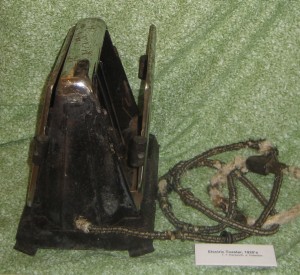The other day I heard the sound of scraping toast.
It was a sound I can’t have heard for twenty years or more–yet at once I was back in the late 1950s and early 1960s before they’d really got the hang of the pop-up toaster. Those were wild days on the kitchen scene. Every other morning, it seemed, we’d forget about the toast until flames leapt through the vent at the top and we risked instant death (according to my mother) poking knives with metal handles inside to lever the charcoaled toast fragments out while smoking crumbs burned in the tray. And then the sound of scraping over the kitchen sink, each over-crisp slice becoming steadily lighter as the sink filled with carbon dust…. Breakfast was never a foregone conclusion.
That period was a strange time in the history of machines. It was the age of the House of the Future and the Ideal Home Exhibition, the birth of the Age of Conveniences when G.E. (spokesperson: Ronald Reagan) brought all manner of fascinating things to life, then strode away, waving and smiling to the admiring crowd, leaving us to deal with those cranky, unpredictable mechanical infants.
This was the era when desire still outstripped design, a golden postwar age of advertising when a new enemy was created, not the Depression or the Nazis or the Commies but Inconvenience, and we were all flattered into believing that nifty inventions would do the work. Dishwasher’s hands and housemaid’s knee would become ailments of the past, and we could all go on to work on our tennis elbow.
But none of these devices, it seemed, had been got quite right yet. Fridges slowly gathered ice, massing in solid cumulus around the tiny freezer cubicle and trapping the packet of fish fingers. Hand-held can openers milled uselessly, unable to get a grip, or ripped lethal jagged edges. Vacuum cleaners were bred with tiny electric-eye headlights and retractable cords, but still clogged up or blew their contents unexpectedly all over the room like the emissions of linty volcanoes. Radios lost their knobs or their belts stretched and slipped, leaving the needle sullenly at one end of the dial. Televisions, of course, were entirely hit-or-miss contraptions, and a generation of fathers climbed on the roof, calling “Better now? Better now?” as they twisted the H towards London or New York while in the living-room the family called back “Yes! No!” as the static cleared to show the anchorman like a lost soul appearing briefly at the window during a blizzard. The stations themselves only aired at midday and in the evening, and sometimes not even then: their staple programming was the embarrassed grin of the newsreader unable to get his feed, the broken film, and the simple card that read “Do Not Adjust Your Set.”
Frustrating though these failed promises were, we put up with them more than you young ‘uns might expect. The Age of Convenience bred in us an urban stoicism, an enforced suffering we chose to see as resourcefulness. When all else failed, as it invariably did, there was always some simple and primeval tool available, a tool that predated the war, probably even the century. Every time the toaster burst into flame, the simple flat knife was there to scrape off the burn. Breakfast had to be eaten, despite it all.
The only complex appliance from those days that made sense, looking back, was the lawnmower. Lawnmowers had no engines then, and I pushed and pulled ours back and forth over and over the same square foot of grass, the tougher stalks wrapping themselves around the axle until everything jammed solid. But this was okay. There was no motor to burn out, no cord to snap or rip out of its socket, no plugs to crud up. I sat cross-legged on the grass and cradled the mower upside down in my lap and unwound the stalks one by one, turning the blade backwards, picking out the last of the grass with my fingernail, a tool I was born with.


Related Articles
No user responded in this post
Leave A Reply